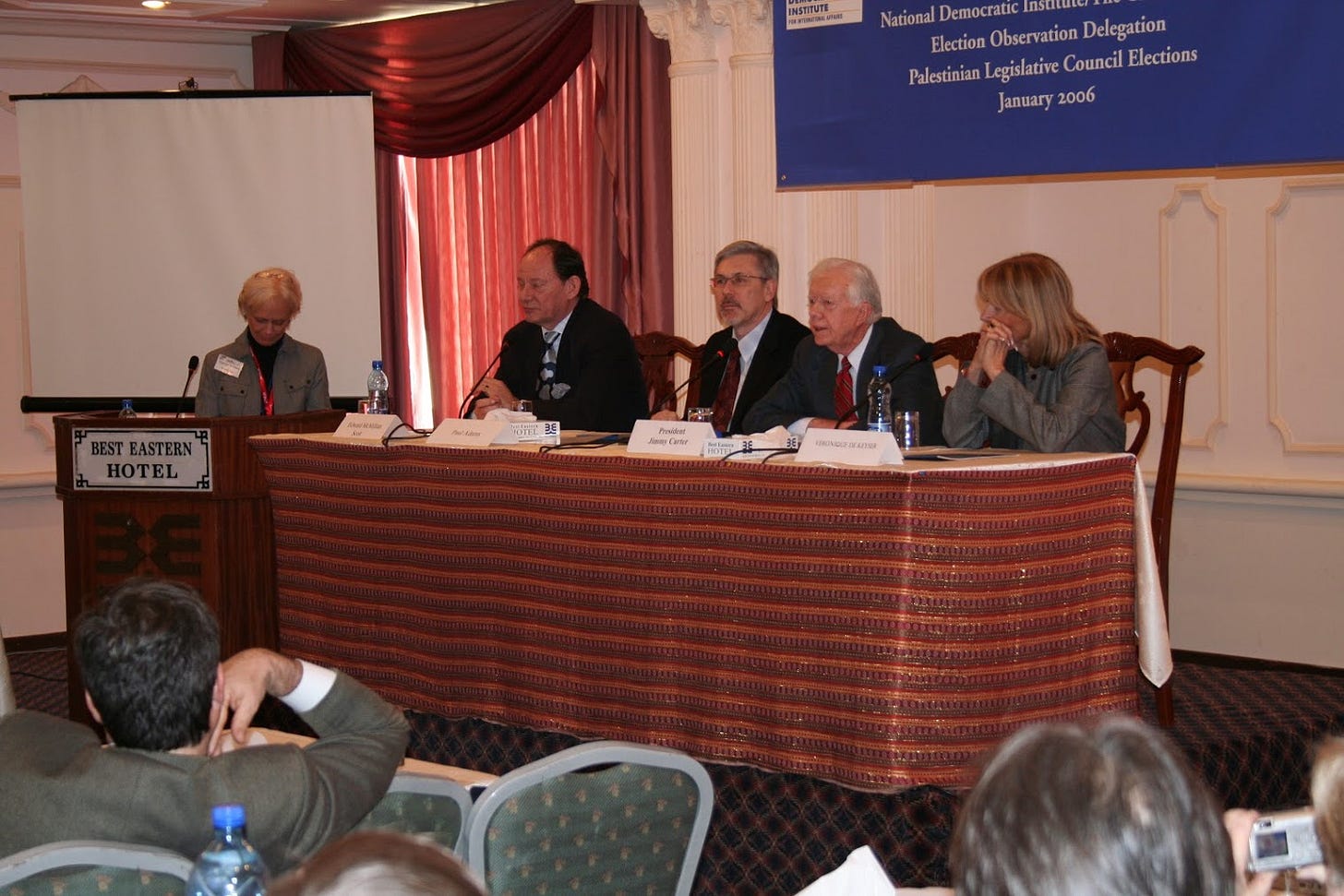
Jimmy Carter is sometimes said to have been the most successful ex-president. He is rightly celebrated for his program to eradicate the Guinea Worm parasitic disease and for his work with Habitat for Humanity to promote affordable housing. But he was also deeply involved in election observation which is how I came to meet him.
In recent days, Carter has begun hospice care at his home in Plains, Georgia, at the age of 98, which made me think of two little stories that reveal a bit about Carter as a human being, his energy, his compassion and his humour.
My first encounter was in 2005, when Carter was leading an observation mission to the Palestinian presidential elections. Yasser Arafat had recently died and the Palestinian Authority was holding elections to replace him.
The Carter Center, the former president’s foundation, mounted the mission along with the National Democratic Institute (NDI). I had had a short spell as the director of NDI’s Palestinian program, which aimed to nurture democratic practices and processes and I was invited to come back to the region to work as a staffer on the mission.
President Carter (as everyone called him) was extremely active during the election day, showing up at dozens of balloting places in Jerusalem and cajoling the Israeli government to relent in its efforts to obstruct the vote. That night, my job was to help write a statement for the ex-president, based on the reports of our team of observers, to be released by him to the media the next day.
It is normal for these things to be drafted through the night because time is essential for an observation mission to communicate whether an election has been fairly run or not. But on this occasion, the former president had an unusual stipulation. We were to slip the completed draft under his hotel room door at 4 a.m.
Why he wanted to see the draft at this ridiculously early hour became clear at about quarter to five, when bleary-eyed Secret Service officers sporting earpieces began circulating through the hotel. President Carter had arranged to go bird-watching at dawn with a group of Israeli and Palestinian experts. Among his many passions, he was an avid birder, and he was not going to miss an opportunity in Jerusalem, which is on key migratory routes due to its location along the Great Rift Valley. This excursion even got a mention in his memoirs.
My second encounter, or rather series of encounters, with President Carter occurred almost exactly a year later, when the Palestinian Authority held a second round of elections, this one to choose its parliamentarians. By an odd set of circumstances, I ended up not as a lowly staffer to the former president but preposterously enough as a kind of peer.
The Canadian prime minister of the day, Paul Martin, had sometime earlier promised that Canada would send an observation mission to these elections. Rumour had it that Martin had former prime minister Brian Mulroney pencilled in to lead the Canadian delegation. However, by coincidence, Canadian elections ended up being scheduled just two days before the Palestinian ones.
So the Canadian government decided to appoint someone considerably more obscure: me.
This is how I found myself, absurdly, in Ramallah, on a panel alongside President Carter and a vice-president of the European Parliament. When it came time for me to speak, I started by saying “Someone take a picture, because my mother will never believe that I am sitting here with President Carter.”
Later, I was invited to a small breakfast with the ex-president, early the morning after the election. His smiles are, as you will have noticed, achingly broad. But beneath the warmth, it was also pretty clear the purpose of the breakfast was to establish, if there was any doubt, that he was primus inter pares He graciously communicated to me and the leader of the EU delegation, without exactly saying so, that he expected that we would not tread on his lines in our own press conferences.
A month or so after the election was over, I completed the final Canadian report on the elections (which Hamas had won, by the way) and as a courtesy, I sent a copy to President Carter along with a note thanking him for his hospitality while I was in Jerusalem.
Before long I got a hand-written note back from him that read: “Thank you very much for your report—and please give my regards to your mother.”





Great stories, priceless last line.
Terrific!